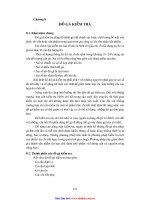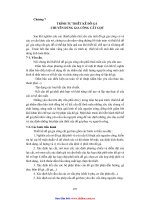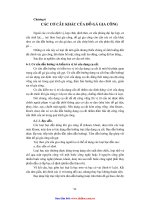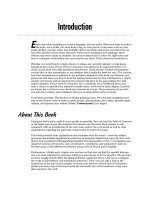Giáo trình động từ tiếng Pháp - Part IV Looking Ahead: The Future and the Conditional Tenses - Chapter 16 ppsx
Bạn đang xem bản rút gọn của tài liệu. Xem và tải ngay bản đầy đủ của tài liệu tại đây (209.68 KB, 8 trang )
Chapter 16
Completing a Future Action
with the Future Perfect
In This Chapter
ᮣ Creating the future perfect tense
ᮣ Knowing the expressions that require the use of the future perfect
I
n today’s world, when everything has to be done yesterday, do you ever say to yourself
“I will have this or that done by a certain time,” such as before you leave the office or by
Friday? If so, you use the future perfect tense.
The future perfect tense is a compound tense requiring an auxiliary and a past participle.
You use it to describe events that will have taken place before another future action. You
can also use the future perfect alone to express that a future action will have been com-
pleted by a certain time in the future. The meaning of this tense in English is
will have done
something.
You can also use the future perfect to express a probability or a supposition. For
example,
Paul n’est pas venu à l’école hier. Il aura été malade means Paul did not come to
school yesterday. He probably was/must have been ill.
Like the simple future tense (see Chapter 15), you use the future perfect with expressions
that imply a future action, such as
when and as soon as. In this chapter, you discover how to
form the future perfect tense and how to correctly use it.
Forming the Future Perfect
The future perfect tense is a compound tense, and it follows the same pattern as all other
past compound tenses in French. You need one of the two auxiliaries,
avoir (to have) or
être (to be), followed by the past participle of any verb you want.
You form the future perfect by putting the auxiliaries in the future tense and adding the past
participle of the verb of your choice. Remember that the choice of the auxiliary depends on
the verb. Most verbs take the auxiliary
avoir, and some take être. (For a list of these verbs
and for the formation of the past participles, see Chapter 12.)
First, you need to know how to conjugate
avoir and être in the future tense. After you conju-
gate the auxiliary, you add the past participle.
23_773883 ch16.qxp 8/2/06 1:35 PM Page 183
avoir (
to have
)
j’aurai nous aurons
tu auras vous aurez
il/elle/on aura ils/elles auront
Ils auront les résultats bientôt. (
They will have the results soon.
)
être (
to be
)
je serai nous serons
tu seras vous serez
il/elle/on sera ils/elles seront
Nous serons à l’heure. (
We will be on time.
)
The following tables show three examples — the verbs finir (to finish), arriver (to
arrive
), and se réveiller (to wake up). Finir takes the auxiliary avoir, arriver takes
être, and se réveiller also takes être.
For pronominal verbs, place the pronominal pronoun in front of the auxiliary être,
which is followed by the past participle of the verb. All pronominal verbs are conju-
gated with the auxiliary
être.
finir (
to finish
)
j’aurai fini nous aurons fini
tu auras fini vous aurez fini
il/elle/on aura fini ils/elles auront fini
Ils auront fini avant le weekend. (
They will have finished before the weekend.
)
arriver (
to arrive
)
je serai arrivé(e) nous serons arrivés(es)
tu seras arrivé(e) vous serez arrivé(s)(e)(es)
il/elle/on sera arrivé(e) ils/elles seront arrivés(es)
Nous serons arrivés avant le 5 août. (
We will have arrived before the 5th of August.
)
184
Part IV: Looking Ahead: The Future and the Conditional Tenses
23_773883 ch16.qxp 8/2/06 1:35 PM Page 184
se réveiller (
to wake up
)
je me serai réveillé(e) nous nous serons réveillés(es)
tu te seras réveillé(e) vous vous serez réveillé (s)(e)(es)
il/elle/on se sera réveillé(e) ils/elles se seront réveillés(es)
Je me serai réveillé(e) de bonne heure pour préparer le petit-déjeuner.
(
I will have awakened early to prepare breakfast.
)
Put the following verbs in the future perfect and then translate the sentences.
Q. Je _________________ (finir) mes exercices.
A. J’aurai fini mes exercices. I will have finished my exercises.
1. Ils _________________ (avoir) un accident.
__________________________________________________________________________________
2.
Elle _________________ (prendre) le vol d’avant.
__________________________________________________________________________________
3.
Tu _________________ (ne pas manger) toute la journée.
__________________________________________________________________________________
4.
Vous _________________ (partir) tôt.
__________________________________________________________________________________
5.
Il lui _________________ (envoyer) des fleurs.
__________________________________________________________________________________
6.
Elle _________________ (appeler) la police.
__________________________________________________________________________________
7.
Ils _________________ (oublier) de fermer à clé.
__________________________________________________________________________________
8.
Tu _________________ (voir) la Joconde.
__________________________________________________________________________________
9.
Vous _________________ (gagner) la loterie.
__________________________________________________________________________________
10.
Il _________________ (rentrer).
__________________________________________________________________________________
185
Chapter 16: Completing a Future Action with the Future Perfect
23_773883 ch16.qxp 8/2/06 1:35 PM Page 185
To put the future perfect in the negative, simply place the ne before the auxiliary and
place
pas or any other negative word after the auxiliary. For pronominal verbs, the ne
precedes the pronominal pronoun and the pas or another negative word follows the
auxiliary.
Il n’aura pas fini sa composition avant la classe. (He will not have finished his
composition before class.
)
Tu ne te seras pas levé avant sept heures. (You will not have gotten up by seven
o’clock.
)
Put these verbs in the future perfect tense and then translate the sentences.
Q. Nous _________________ (ne pas se rencontrer) avant samedi.
A. Nous ne nous serons pas rencontrés avant samedi. We will not have met each other
before Saturday.
11. Il _________________ (partir) avant huit heures.
__________________________________________________________________________________
12.
Nous _________________ (ne pas manger) avant de sortir.
__________________________________________________________________________________
13.
Les enfants _________________ (rentrer) après avoir joué au foot.
__________________________________________________________________________________
14.
Dans une semaine, tu _________________ (recevoir) ton diplôme.
__________________________________________________________________________________
15.
Tu _________________ (se réveiller) avant notre départ.
__________________________________________________________________________________
16.
Mes parents _________________ (ne pas arriver) avant dix heures.
__________________________________________________________________________________
17.
Dans trois jours nous _________________ (partir) pour l’Australie.
__________________________________________________________________________________
18.
Je _________________ (poster) les cartes postales avant la fin de la journée.
__________________________________________________________________________________
19.
Avant de quitter le pays, Eric _________________ (vendre) sa voiture.
__________________________________________________________________________________
20.
Tu _________________ (ne pas rester) après minuit.
__________________________________________________________________________________
186
Part IV: Looking Ahead: The Future and the Conditional Tenses
23_773883 ch16.qxp 8/2/06 1:35 PM Page 186
Using the Future Perfect Correctly
Like the future tense (see Chapter 15), you can use the future perfect with expressions
that imply a future action, as in the expressions
as soon as and when. However, doing so
is very different from English, which uses the present or present perfect tense. Check
out the following example: In English, you say
As soon as I finish my courses, I will
receive my diploma.
You haven’t finished your courses yet, so this statement implies
a future action. In French, you can either use the future simple tense in both clauses
(
As soon as I will finish my courses, I will receive my diploma.) or because one action
(the fact that I will have to finish my courses) has to happen before another action can
take place (I will receive my diploma), you use the future perfect followed by the future
(
As soon as I will have finished my courses, I will receive my diploma).
Dès que je finirai mes cours, je recevrai mon diplôme. (As soon as I will finish my
courses, I will receive my diploma.
)
Dès que j’aurai fini mes cours, je recevrai mon diplôme. (As soon as I will have
finished my courses, I will receive my diploma.
)
You can also use the future or future perfect after the expressions
après que (after),
tant que (as long as), or une fois que (once) if future action is implied. Table 16-1 lists
some common French expressions. If you see one of these expressions, you may need
to use the future perfect tense if the future is implied.
Table 16-1 Common Future Perfect Expressions
French Expression English Translation
après que
after
aussitôt que
as soon as
dès que
as soon as
lorsque
when
quand
when
tant que
as long as
une fois que
once
Après que mes invités seront arrivés, je servirai l’apéritif. (After my guests will
have arrived, I will serve the aperitif.
)
You can also use the future perfect to express or even explain a probability.
Caroline n’est pas chez elle, elle aura travaillé tard. (Caroline is not at home, she
must have had to work late.
)
Choose between the future and the future perfect. Remember to put the action that
has to come first in the future perfect and the action that comes second in the simple
future.
187
Chapter 16: Completing a Future Action with the Future Perfect
23_773883 ch16.qxp 8/2/06 1:35 PM Page 187
Q. Une fois que nous _________________ (faire) nos devoirs, nous _________________ (aller)
voir un film.
A. Une fois que nous aurons fait nos devoirs, nous irons voir un film. (Once we will have
done our homework, we will go see a movie.
)
21. Je te _________________ (payer) aussitôt que je _________________ (toucher) mon chèque.
22. Après qu’il _________________ (trouver) un emploi, sa femme _________________
(ne plus travailler).
23. Lorsque que l’entrepreneur _________________ (construire) notre maison, nous
_________________ (déménager).
24. Nous _________________ (sortir) après qu’Alexandre _________________ (s’habiller).
25. Une fois que je _________________ (acheter) les billets, nous _________________ (pouvoir)
entrer.
26. Quand je _____ (finir) mes études, mes parents me _________________ (donner) un
cadeau.
27. Vous _____ (envoyer) votre curriculum vitae quand tu le _________________ (rédiger).
28. Tu _____ (faire) le tour du monde lorsque tu _________________ (gagner) à la loterie.
29. Aussitôt que vous _________________ (se lever), je vous _________________ (préparer)
quelque chose à manger.
30. Une fois qu’elle _________________ (prendre) des médicaments, elle _________________
(se sentir) mieux.
188
Part IV: Looking Ahead: The Future and the Conditional Tenses
23_773883 ch16.qxp 8/2/06 1:35 PM Page 188
Answer Key
This section includes the answers to the practice problems in this chapter. Compare
your answers to see how you did.
a
Ils auront eu un accident. They probably had/must have had an accident.
b
Elle aura pris le vol d’avant. She probably took/must have taken an earlier flight.
c
Tu n’auras pas mangé toute la journée. You will not have eaten/probably have not eaten all day.
d
Vous serez parti tôt. You will probably have left/must have left early.
e
Il lui aura envoyé des fleurs. He will have sent/probably sent her/him flowers.
f
Elle aura appelé la police. She will have called/probably called/must have called the police.
g
Ils auront oublié de fermer à clé. They probably forgot/must have forgotten to lock the door.
h
Tu auras vu la Joconde. You will have seen/probably saw/must have seen the Mona Lisa.
i
Vous aurez gagné la loterie. You probably won/must have won the lottery.
j
Il sera rentré. He will have come back home/probably came/must have come home.
k
Il sera parti avant huit heures. He will have left by eight o’clock.
l
Nous n’aurons pas mangé avant de sortir. We will not have eaten before leaving.
m
Les enfants seront rentrés après avoir joué au foot. The children will have come home after
having played soccer.
n
Dans une semaine, tu auras reçu ton diplôme. In a week, you will have received your diploma
(will have graduated).
o
Tu te seras réveillé(e) avant notre départ. You will have awakened before our departure.
p
Mes parents ne seront pas arrivés avant dix heures. My parents will not have arrived before/by
ten o’clock.
q
Dans trois jours nous serons partis pour l’Australie. In three days, we will have left for Australia.
r
J’aurai posté les cartes postales avant la fin de la journée. I will have mailed the postcards
before the end of the day.
s
Avant de quitter le pays, Eric aura vendu sa voiture. Before leaving the country, Eric will have
sold his car.
t
Tu ne seras pas resté(e) après minuit. You will not have stayed after midnight.
u
Je te paierai aussitôt que j’aurai touché mon chèque. (I will pay you as soon as I will have
cashed my check.
)
v
Après qu’il aura trouvé un emploi, sa femme ne travaillera plus. (After he will have found a
job, his wife will no longer work.
)
189
Chapter 16: Completing a Future Action with the Future Perfect
23_773883 ch16.qxp 8/2/06 1:35 PM Page 189
w
Lorsque que l’entrepreneur aura construit notre maison, nous déménagerons. (When the con-
tractor will have built our house, we will move.
)
x
Nous sortirons après qu’Alexandre se sera habillé. (We will go out after Alexandre will have
gotten dressed.
)
y
Une fois que j’aurai acheté les billets, nous pourrons entrer. (Once I will have bought the tickets,
we will be able to enter.
)
A
Quand j’aurai fini mes études, mes parents me donneront un cadeau. (When I will have fin-
ished my studies, my parents will give me a gift.
)
B
Vous enverrez votre curriculum vitae quand vous l’aurez rédigé. (You will send your curriculum
vitae
[résumé] when you will have written it up.)
C
Tu feras le tour du monde lorsque tu auras gagné à la loterie. (You will take a trip around the
world when you will have won the lottery.
)
D
Aussitôt que vous vous serez levé, je vous préparerai quelque chose à manger. (As soon as
you will have gotten up, I will prepare you something to eat.
)
E
Une fois qu’elle aura pris des médicaments, elle se sentira mieux. (Once she will have taken
medication, she will feel better.
)
190
Part IV: Looking Ahead: The Future and the Conditional Tenses
23_773883 ch16.qxp 8/2/06 1:35 PM Page 190









